Find the Best Food for Your German Shepherd
German Shepherds are majestic, faithful, and mighty intelligent dogs. Unfortunately, as a large breed, they are also prone to developing hip and joint issues, especially at the earlier stages of their life.
This is why it’s so vital to provide your German Shepherd with a well-balanced diet in all stages of its life from a little puppy to a senior dog. Ideally, the best food for a German Shepherd should be high in quality meat protein and low in inflammation markers. Finding it, however, can get tricky as there are tons of dog food brands to consider.
Luckily, you have MutzNutz. Not only do we have the best quality dog food at our store, but we’re also the #1 online source for everything dog food related.
Read on and learn how to design the best diet for your German Shepherd, keeping it happy and healthy from puppy to senior.
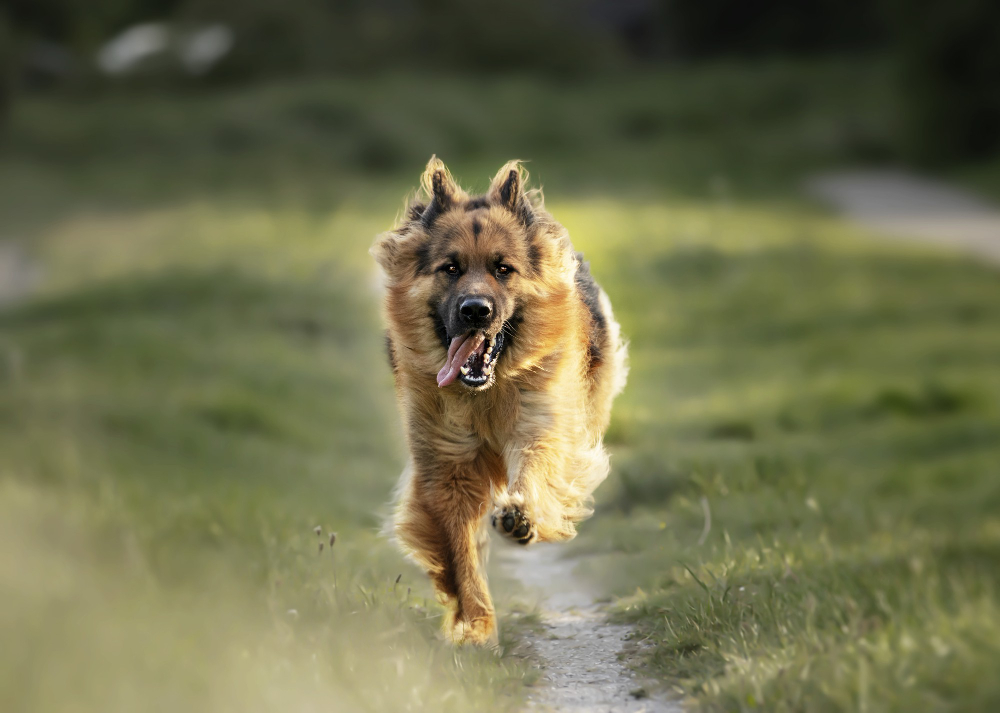 Understanding German Shepherds’ Nutritional Needs
Understanding German Shepherds’ Nutritional Needs
Like any other pedigree breed, German Shepherds have genetic traits and predispositions that increase their chances of developing certain health issues. The most common problems associated with GPDs include hip and elbow dysplasia, atopic skin disease, and degenerative myelopathy.
Whether your pup develops such conditions depends on multiple factors, including their diet. By feeding your German Shepherd the right food, you can significantly reduce the risk of it developing mentioned issues.
For this reason, it’s crucial to consider your dog’s dietary needs at various stages of its life. Here’s a quick breakdown of what a German Shepherd requires from its diet as it grows from a puppy to an adult dog:
German Shepherd Puppy (Up to 12 Months)*
German Shepherd puppies grow quicker than many other breeds. Uncontrolled growth can result in a pup developing joint and hip issues, which is why selecting high-quality and well-balanced food for your German Shepherd puppy is imperative.
Also, because they grow so rapidly, German Shepherd puppies are typically on a puppy-specific diet for no longer than six months instead of the usual twelve.
Regarding young German Shepherd puppies’ nutritional needs, consider the following when searching for the best food for your pup:
- High Protein & Fat: Your puppy food should be high in protein and fat to support the growth and development of muscles, bones, and brain.
- Balanced Calcium & Phosphorus: Crucial for strong, healthy bones and joints, balanced calcium content is a must when shopping for the right food for your pup.
- Multiple Small Meals: Focus on giving your pup multiple smaller meals to cater to the puppy’s high metabolism and smaller stomach.
Adult German Shepherd (1 – 7 Years Old)
As your German Shepherd transitions from a pup to an adult dog, its nutritional needs change. Here’s what to consider when crafting a diet for an adult German Shepherd:
- Quality Protein: Provide your dog with foods high in protein to promote strong muscles and support its energy levels.
- Healthy Fats: Ensure the dog food you buy is high in healthy fats that promote healthy skin, coat, and cognitive function.
- Balanced Diet: Keep your German Shepherd’s diet well-balanced, providing it with all essential vitamins and minerals for overall health.
Senior German Shepherd (7+ Years Old)
At around 7 years old, your adult German Shepherd (un)officially becomes a senior dog. During the final stage of its life, your dog’s diet should focus on supporting its joint health and weight control. For these reasons, consider the following when searching for the right food for your senior dog:
- Increased Fibre: Foods high in fibre support digestion and help maintain a healthy weight as your dog becomes less active and more prone to gaining weight.
- Glucosamine & Chondroitin: Foods high in these two components support joint health and mobility.
- Lower Calorie Intake: Consider the lower calorie intake, which might be needed to prevent obesity in less active senior German Shepherds.
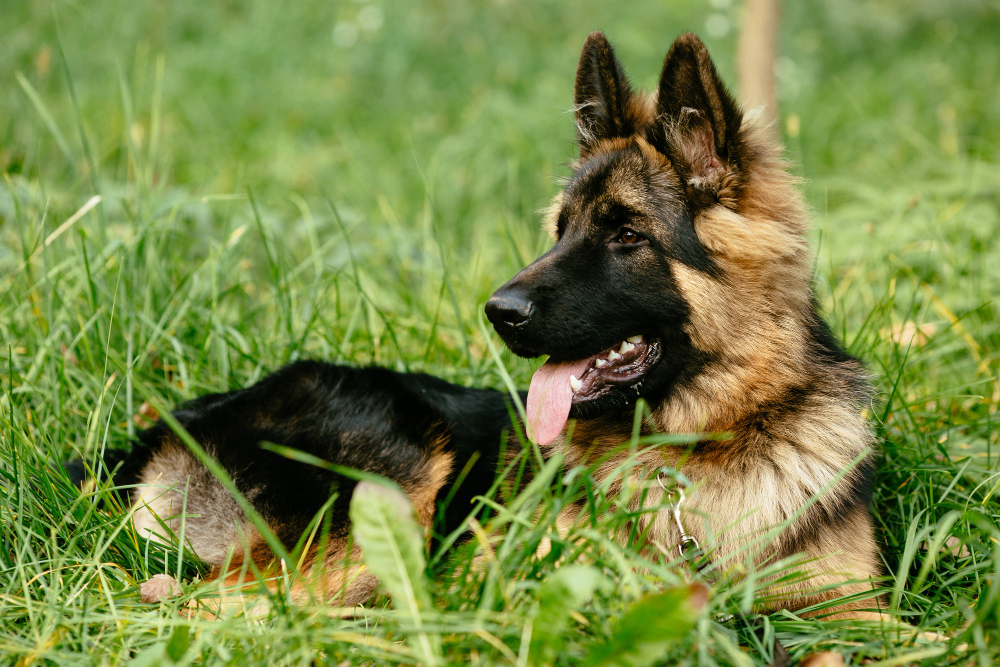
How Much Should a German Shepherd Eat a Day?
German Shepherds are a large breed, usually weighing between 60 and 90 pounds. How much you feed your dog depends on several factors, primarily its age, size, weight, activity level, and the type of food it eats.
A rule of thumb here is to look for the amount of Kcal per 100 grams. The higher the amount, the more calories the food contains requiring you to adjust how much you give your dog. Be careful here as it can be tricky to estimate the right amount of food to feed your German Shepherd at different stages of its life.
A general recommendation is that puppies require 800-1000 calories a day (this amount increases as they grow), while active adult dogs should consume from 1500 to even 2000 calories a day. If you have an older or less active German Shepherd, the recommended daily intake is between around 1200 and 1600 calories.
The best idea is to consult the calorie intake and other food-related considerations with a vet. They will be able to provide you with a more detailed estimation and personalised recommendations regarding your German Shepherd’s diet, ensuring all its nutritional needs are met and that it stays happy and healthy throughout its life.
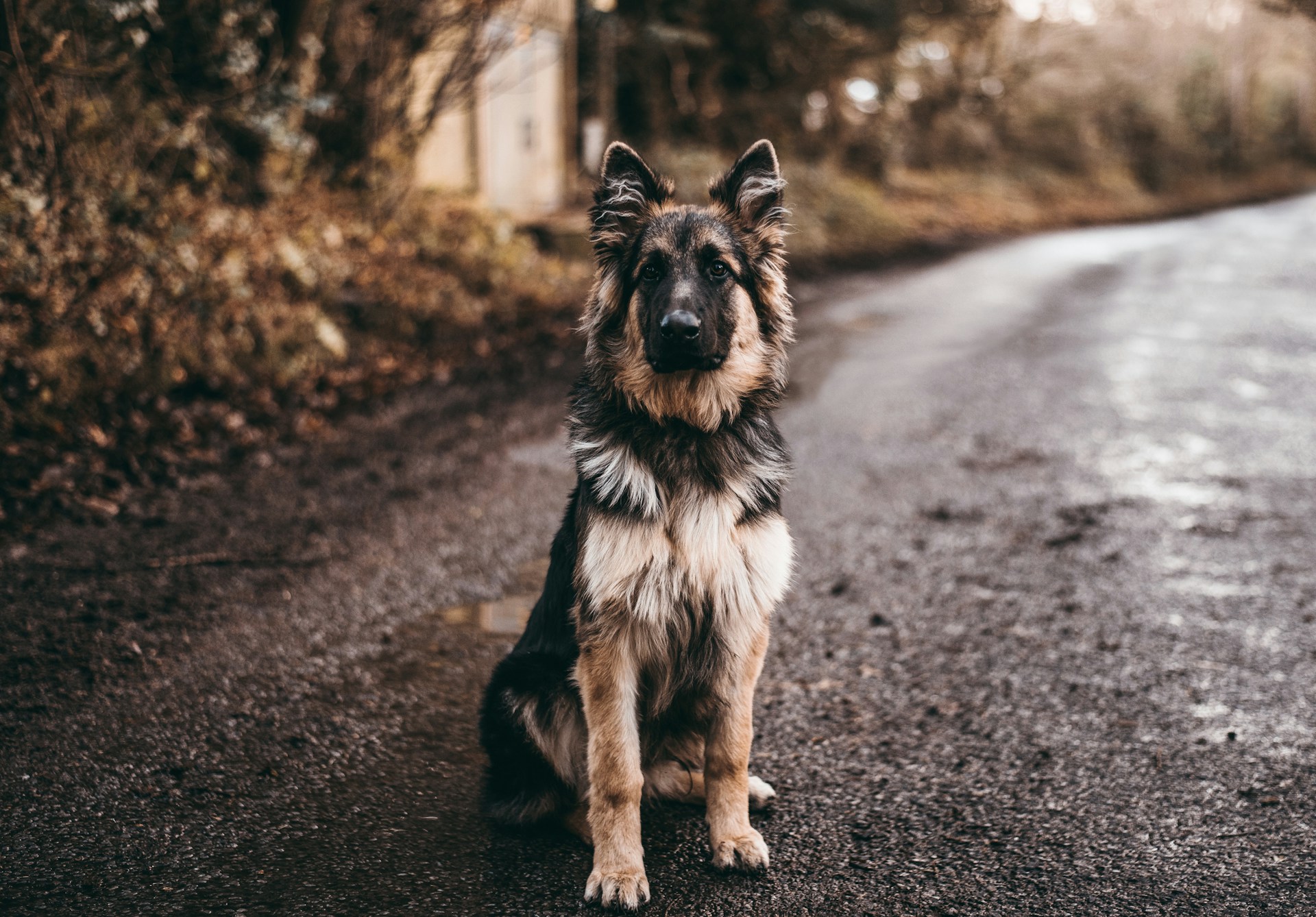
Best Dog Food for German Shepherds: MutzNutz Top Picks
Having covered the basics of German Shepherds’ nutrition and diet considerations, let’s go through our top picks for the best dog food for your German Shepherd, all available at our MutzNutz online store:
Best Food for German Shepherd Puppies
#1 Hunters – Large Breed Puppy Salmon & Potato
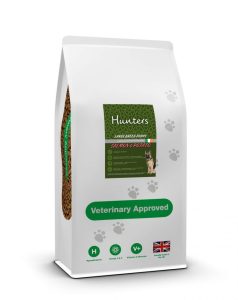 |
Our Rating: 5/5
Main Protein Source: fish Key ingredients: salmon, potatoes, omega 3s and 6s, zinc, and biotin Type: Dry Food Best for: German Shepherd pups Why we chose it:
|
#2 Gain Elite Big Dog Puppy – Chicken & Rice
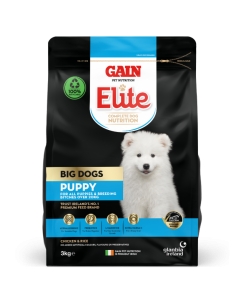 |
Our Rating: 5/5
Main Protein Source: chicken Key Ingredients: chicken, turkey, and rice Type: dry food Best for: German Shepherd pups Why we chose it:
|
#3 Canagan Puppy Feast Grain-Free
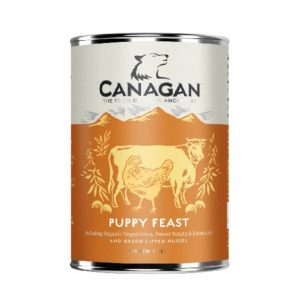 |
Our Rating: 5/5
Main Protein Source: meat Key Ingredients: 35% free-run chicken, 30% beef, sweet potato, botanicals, and green-lipped mussel Type: wet food Best for: German Shepherd pups Why we chose it:
|
Best Food for Adult German Shepherds
#1 Return to the Wild – Grain-Free Adult Large Breed – Turkey, Sweet Potato & Cranberry
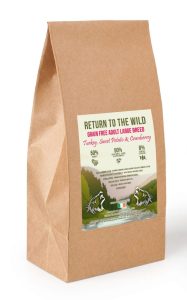 |
Our Rating: 5/5
Main Protein Source: turkey Key Ingredients: 50% turkey, 50% vegetables, seeds and supplements Type: dry food Best for: Adult German Shepherds Why we chose it:
|
#2 Hunters – Adult Duck & Potato
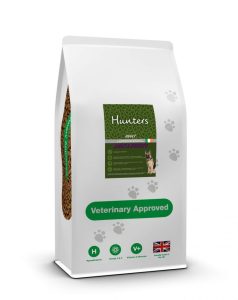 |
Our Rating: 5/5
Main Protein Source: duck Key Ingredients: 36% duck, 31% potato, and 7% peas and beet pulp Type: dry food Best for: Adult German Shepherds Why we chose it:
|
Best Dog Food for Senior German Shepherds
#1 Burns Adult & Senior Weight Control – Chicken & Oats
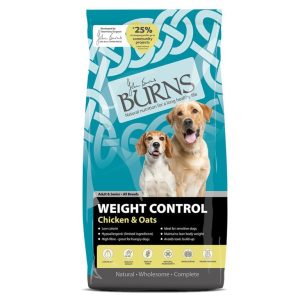 |
Our Rating: 5/5
Main protein source: meat Key ingredients: 40% oats, 17% chicken, 18% brown rice, and minerals Type: dry food Best for: Adult and Senior German Shepherds Why we chose it:
|
#2 Canagan Complete Wet Food – Grain-Free Senior Fest
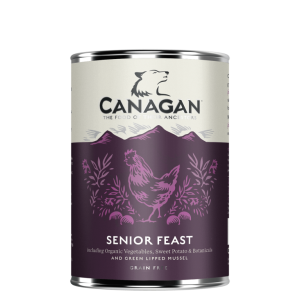 |
Our Rating: 5/5
Main Protein Source: poultry Key Ingredients: 40% chicken, 20% turkey, vegetables (sweet potato, carrots, peas, broccoli) Type: wet food Best for: Senior German Shepherds Why we chose it:
|
Wrapping Up
Crafting the best possible diet for your German Shepherd is vital for ensuring your dog receives the proper nutrition for healthy development and support at every stage of its life. The products you see above should help ensure that.
Coming from top brands and manufactured with quality and attention to detail, the above selection of dog food contains all the vitamins and minerals your German Shepherd needs to grow into a healthy and happy dog.
Even better, all these products are available at our MutzNutz store.
And remember, whenever you want to design or change your German Shepherd’s diet, consult it with a veterinarian. With frequent checks and premium dog food from our online store, your German Shepherd is sure to live a healthy and joyful life.
 Irish Owned
Irish Owned